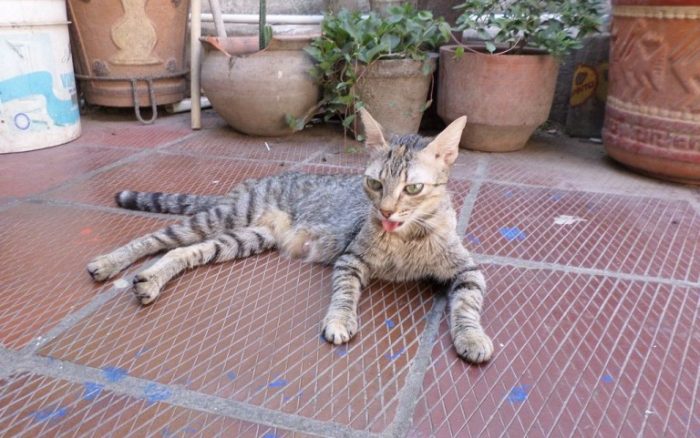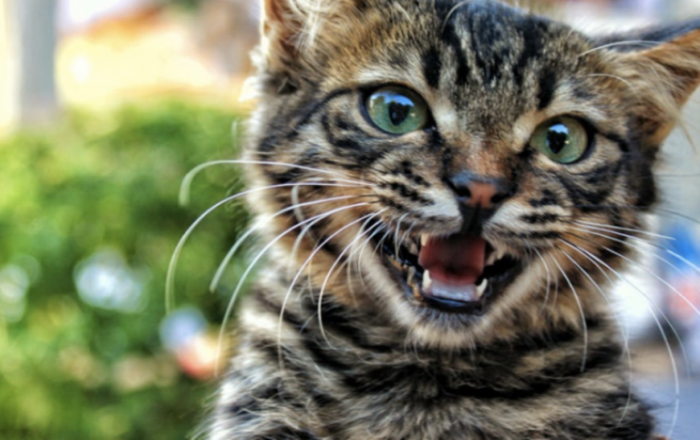Just like humans, cats take in oxygen through their noses, which helps to nourish their blood and organs. Cat panting can be normal on one hand, depending on some underlying factors, and, on the other hand, can signify a severe medical condition that needs to be checked. Generally, a cat’s breathing is more rapid than humans, according to research, while a human’s resting respiration rate can range between twelve to sixteen breaths per minute, cats take between twenty to thirty breaths per minute on average. When a cat’s breathing becomes faster and labored, tending towards panting, it can become a cause of concern to the cat owner and also the beginning of a severe medical condition.
Table of Contents
Do Cats Pant Like Dogs?
Most healthy dogs pant when excited and it has also been confirmed that it is a way for them to cool down. On the other hand, cat panting can be observed on rare occasions but not as frequently as what is observed among the canine population. There are several occasions that can lead to cat panting, they can pant when excited, stressed, overheated, or panting could be a sign of some far-reaching medical conditions.
Is it Normal for a Cat to Pant?
Depending on how active or heavy your cat is, it can exhibit different forms of breathing, ranging from rapid to heavy. As cats differ, it is possible that panting can mean different things in different cats. Moreover, it has been confirmed that different breeds are prone to pant more than others. They include Persians, Himalayans, Maine Coon, and most long-haired breeds.
Generally, cats pant when they are nervous or hot. Panting can also be a thermoregulation mechanism that they use to control their temperature in hot weather when they become overheated.
Symptoms of Abnormal Cat Panting
Heavy breathing in cats can be categorized into three:
Labored Breathing or Dyspnea
Whenever a cat has difficulty in breathing, it is called dyspnea. The symptoms can include chest and/or belly movement while breathing, noisy breathing, flaring of the nostrils with each breath, the opening of the mouth while breathing, restlessness, and inability to sleep, and extension of the neck and head when breathing.
Shallow and Rapid Breathing or Tachypnea
A cat can be oblivious even if its breathing is labored so it is left for the owner to detect this on time. The symptoms of tachypnea can manifest in cyanosis (which signals inadequate oxygenation). Another symptom is fatigue and reluctance to move or exercise.
Breathing rapidly with the mouth open or panting
This could be another reason for cat panting or heavy breathing. The cat combines breathing heavily with leaving the mouth open to probably get enough air. This can happen when they are exposed to excessive heat or have overexerted themselves.
All the types and symptoms of heavy breathing or cat panting discussed above are not normal. Any cat that exhibits any of these symptoms needs to visit the vet immediately.
What Causes Abnormal Cat Panting?
As mentioned earlier, an observant cat owner should always watch out for strange symptoms, which can lead to early detection of any disease or illness. The causes of abnormal panting can range from nasal disorders, trachea disorders, Asthma tumors, Anemia, Hypoxemia, infection of the lungs, respiratory infection, congestive heart failures, heartworms, disorders in the abdomen, or even trauma.
Home Remedies for Overheated Cats

When the weather becomes extremely hot, both outdoor cats and indoor-only cats in homes without an air-conditioner begin to pant in a bid to cool off. In view of this fact, pet parents should do well to pay close attention to their feline companions when the weather becomes excessively hot; This is to ensure that the cat is not getting overheated.
Whatsmore, ensure that your furry friend has a regular supply of fresh, cool water. If your kitty is the type that loves to play around with ice cubes, it wouldn’t hurt to add a few to its water bowl. When your pet cat appears to be too hot, an air conditioner or fan will come in handy for cooling it down. Conversely, a cool damp cloth can be used in wiping it down, or you can let it lie down on the tiled floor, which is equally cooling.
Other home remedies for overheated cats are to use a paper towel to wrap up some ice cubes and rub some on the cat’s body. The cat’s body temperature will cool down as the moisture evaporates from its coat. However, we must exercise caution in the case of hyperthermia. If hyperthermia occurs, ice cubes and cold water cannot be used as they are capable of engendering life-threatening medical problems. In cases like this, cat panting can be controlled with lukewarm water, which is used to wipe its body, and a fan can be used to increase the airflow around the cat’s body.
Symptoms of hyperthermia are bright red gum or tongue, rapid panting, dizziness, pale gums, thick saliva, weakness, vomiting, depression, diarrhea, as well as appearing to be in a coma or shock.
Read Also: Cat Limping Symptoms, Causes, Diagnosis, And Treatment
When to Visit a Vet About Cat Panting
Generally, a regular respiration rate for a cat should be between 20 to 30 breaths per minute. When it exceeds this number, it is definitely a cause for concern.
However, not every panting results in a visit to the vet. It is pertinent to observe closely, the nature and cause of panting before deciding if it’s an emergency. If the panting happens after a walk or playtime, the cat should be allowed to cool down, given water, placed in a room with air-conditioning, and monitored closely.
If the cat pants after a day of resting and not doing much and then exhibits some strange behaviors, it is definitely worth a visit to the vet.
In conclusion, cat panting should be temporary, and once it has gone on for too long, something needs to be done. Recommendations from professionals are that they are kept calm and quiet and brought to the clinic as soon as possible for physical exams and diagnostic tests.
